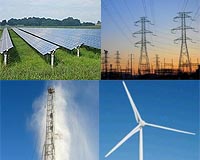 |
Copenhagen, Denmark (SPX) Nov 22, 2010 Riso Energy Report 9 lists a wide range of energy technologies in the market with low or no emissions of greenhouse gases, describing how several of these will be made commercially available in the next decades. However, it is not possible to make the world's energy supply CO2-free as cheaply as possible, using only technology development in the current energy systems. There must be room for technological leaps and there is a need for an integrated process to optimise the entire energy system, from energy production, through transformation into energy carriers, to energy transportation and distribution and efficient end use. There is also a need for a smart grid, connecting production and end use at local level. End users should contribute to maintain balance in the future energy system and new technologies should be introduced to the end users, including houses with low and flexible consumption, smart electronic equipment, heat pumps, energy storage and local energy supplies such as solar cells and micro CHP. Information and communication technology (ICT) will determine how successful the integration of renewables into the grid actually will be. Considering the security of supply in the short and long term, there is still a need for access to fossil fuels, but they must be continuously replaced with renewable energy sources. If we do not make efforts to promote renewable energy sources, coal and gas might easily be prevailing in the global energy supply for the rest of this century. For many countries, however, it could be advantageous to switch to renewable energy sources in order to reduce dependence on imported oil and gas. In addition, this transition can help the countries achieve their environmental policy goals. Seen in isolation, Denmark has a great chance for achieving these goals and for phasing out fossil fuels at a rapid pace and thus reduce emissions of greenhouse gases at the required pace. Danish wind and biomass resources in particular will make it possible to phase out fossil fuels in connection with power generation and heat production before 2040. It will take further 10 years to eliminate fossil fuels within the transport sector. A future smart energy system requires that we start investments now. If we do not make these investments, future generations will look back on this period wondering how we could be satisfied with an outdated energy system, without taking advantage of the opportunities which we already were aware of.
Share This Article With Planet Earth
Related Links Risoe National Laboratory for Sustainable Energy, the Technical University of Denmark
 US wants China to reciprocate green energy subsidies
US wants China to reciprocate green energy subsidiesShanghai (AFP) Nov 15, 2010 US Energy Secretary Steven Chu said on Monday China should allow foreign companies to qualify for its subsidies aimed at encouraging renewable energy projects. Chu said foreign firms, including Chinese companies, qualify for US clean energy subsidies but barriers, such as Beijing's local content requirements, exclude US companies from receiving government help in China. "The United State ... read more |
|
| The content herein, unless otherwise known to be public domain, are Copyright 1995-2010 - SpaceDaily. AFP and UPI Wire Stories are copyright Agence France-Presse and United Press International. ESA Portal Reports are copyright European Space Agency. All NASA sourced material is public domain. Additional copyrights may apply in whole or part to other bona fide parties. Advertising does not imply endorsement,agreement or approval of any opinions, statements or information provided by SpaceDaily on any Web page published or hosted by SpaceDaily. Privacy Statement |